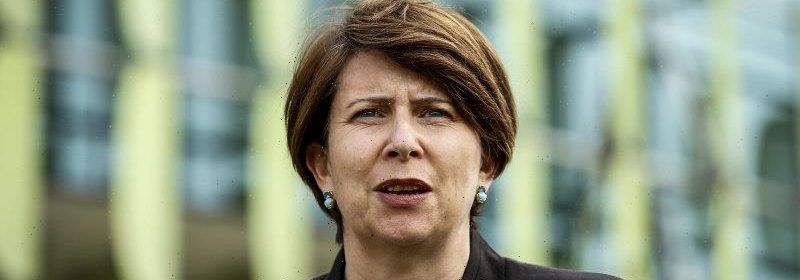Cancer ward of Royal Children’s Hospital Melbourne COVID exposure site

For our free coronavirus pandemic coverage, learn more here.
Child cancer patients and their families have been forced into quarantine for 14 days after a parent unknowingly infected with the virus visited the Royal Children’s Hospital.
Children receiving treatment in the Kookaburra cancer ward and their parents were told they must isolate for 14 days in their child’s hospital room, or at home if they were due to be discharged, after the oncology unit was deemed a tier-1 exposure site.
Royal Children’s Hospital chief executive Bernadette McDonald speaking to reporters this afternoon.Credit:Getty Images
The hospital’s chief executive, Bernadette McDonald, said the exposure inside the hospital’s cancer ward was detected because a parent who stayed in the ward tested positive to the virus.
“The positive result has just come through a couple of days ago,” Ms McDonald told reporters on Wednesday afternoon. “But [the patient’s] mum and dad had been in a couple of days before that.”
Ms McDonald said the hospital had single rooms available where patients could isolate safely with parents or carers.
Contact tracing is underway, and it is not yet clear how many patients and their family members have been affected.
Ms McDonald said the hospital tried to limit exposure to COVID-19 while also letting children receiving cancer treatment have visitors.
“We are finding a balance between allowing mums and dads and carers to come in – just a single person with a child – so that their care is maximised, and they feel less anxious when they have someone with them,” she said.
Ms McDonald said any time the hospital was exposed to the virus was concerning, but it was widely accepted that COVID-19 was not as severe for children as it was for adults.
“We are not seeing the extreme illness in children,” she said.
Research on children with cancer who are infected with coronavirus is limited.
A study in the Lancet Oncology Medical Journal published earlier this year examined the outcomes of more than 1500 children with cancer, who later contracted coronavirus. It found roughly 20 per cent had a serious bout of the disease.
Infectious diseases’ paediatrician Robert Booy said most children and adolescents with cancer still only suffered mild illness from a COVID-19 infection, but in rarer cases some did experience severe disease because they were immuno-compromised.
“They have lower immunity, so they are at greater risk than children who are not undergoing cancer treatment,” he said.
But he said close monitoring and daily testing of the children would ensure early detection and lessen any chance of adverse outcomes.
Earlier on Wednesday, a letter was sent to parents and carers informing them the Kookaburra cancer ward had been exposed to COVID-19.
“While you are isolated in your child’s room, you are not permitted to leave the room for any period of time,” the letter said.
“No other carers, siblings or visitors are permitted to attend your room. We also ask that you keep your room door closed as much as possible during this time.”
Ms McDonald said the hospital’s aim was to keep everyone safe, but she warned more coronavirus exposures at the hospital could not be ruled out, even with robust screening processes.
“This is something we’re seeing on a regular basis, and that’s why we have our screening processes in place, so the minute somebody is positive we can find out about that and try to keep people out of the hospital as much as possible,” she said.
“We have been dealing with them [COVID exposures] for quite some time. Sadly, we will continue to deal with them as we go into the future, as the number of COVID-positive people in the community increases.”
Separately, 12 children with coronavirus are currently receiving treatment from the hospital. Four of them are in the hospital, while eight are being treated in at-home care.
Stay across the most crucial developments related to the pandemic with the Coronavirus Update. Sign up for the weekly newsletter.
Most Viewed in National
From our partners
Source: Read Full Article

